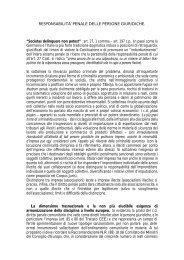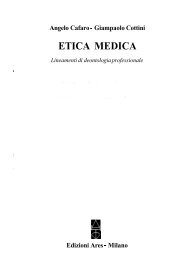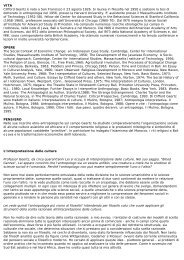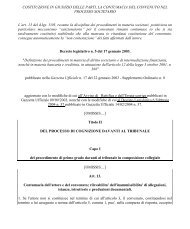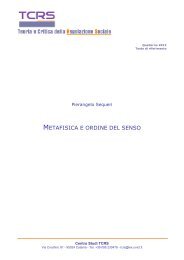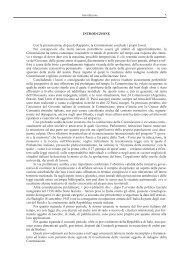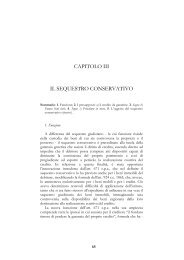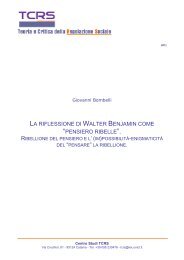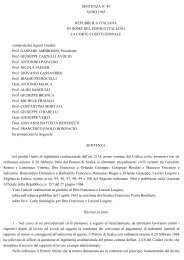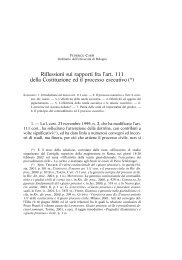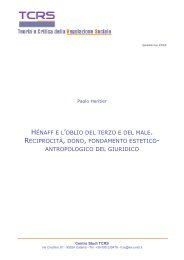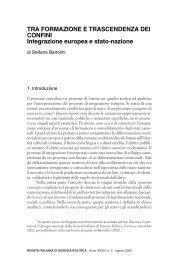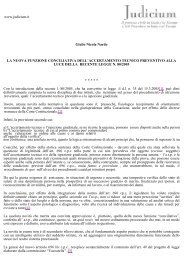FOGLI DI LAVORO per il Diritto internazionale 3 ... - Giurisprudenza
FOGLI DI LAVORO per il Diritto internazionale 3 ... - Giurisprudenza
FOGLI DI LAVORO per il Diritto internazionale 3 ... - Giurisprudenza
Create successful ePaper yourself
Turn your PDF publications into a flip-book with our unique Google optimized e-Paper software.
202<br />
<strong>FOGLI</strong> <strong>DI</strong> <strong>LAVORO</strong> <strong>per</strong> <strong>il</strong> <strong>Diritto</strong> <strong>internazionale</strong> 3/2008<br />
of judicial interpretation, since there w<strong>il</strong>l always be a need for<br />
clarification of doubtful points and for adaptation to particular<br />
circumstances. A margin of doubt in relation to borderline facts<br />
does not by itself make a legal provision unforeseeable in its<br />
application. Nor does the mere fact that such a provision is<br />
capable of more than one construction mean that it fa<strong>il</strong>s to meet<br />
the requirement of “foreseeab<strong>il</strong>ity” for the purposes of the<br />
Convention. The role of adjudication vested in the courts is<br />
precisely to dissipate such interpretational doubts as remain,<br />
taking into account the changes in everyday practice (see<br />
Gorzelik, cited above, § 65, and Kafkaris v. Cyprus [GC], no.<br />
21906/04, § 141, ECHR 2008-...). Furthermore it is, in the first<br />
instance, for the national authorities, and in particular the courts,<br />
to interpret and apply domestic law (see Jahn and Others v.<br />
Germany [GC], nos. 46720/99, 72203/01 and 72552/01, § 86,<br />
ECHR 2005-).<br />
89. The Court notes that in its decision of 26 June 2002 the<br />
Federal Constitutional Court found that the legal basis of the<br />
interference under consideration was provided by the Basic<br />
Law. The duty of imparting information on subjects of public<br />
concern was one of the governmental tasks directly assigned by<br />
the Basic Law to the Government. The Court accepts that it can<br />
prove difficult to frame law with a high precision on matters<br />
such as providing information, where the relevant factors are in<br />
constant evolution in line with developments in society and in<br />
the means of communication, and tight regulation may not be<br />
appropriate. In these circumstances, the Court considers that the<br />
Government's information-imparting role did not require further<br />
legislative concretisation.<br />
90. As to the applicant associations' argument that the<br />
legislature had fa<strong>il</strong>ed to enact adequate legal rules to protect<br />
them against arbitrary interferences by public authorities with<br />
their right to manifest their religion or belief, the Court observes<br />
that, according to the Federal Constitutional Court, the Basic<br />
Law did not grant an unfettered discretion to the Government<br />
when imparting information. Statements affecting the very<br />
essence of the right guaranteed by Article 4 §§ 1 and 2 of the<br />
Basic Law must be appropriate in relation to the cause for<br />
concern. The State had to observe neutrality in religious or<br />
ph<strong>il</strong>osophical matters and was forbidden from depicting a



